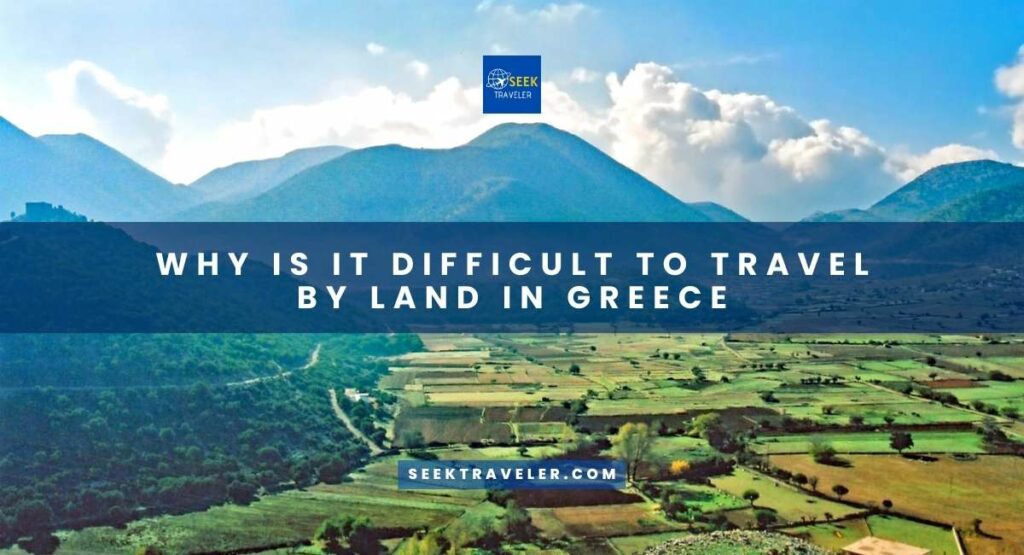As a travel enthusiast, I have always been drawn to the picturesque beauty of Greece. Its turquoise waters, ancient ruins, and whitewashed buildings have captured my imagination for years. However, despite its undeniable charm, I quickly discovered that traveling by land in Greece can be quite challenging.
The rugged terrain of Greece makes it difficult to navigate through the country. With mountains covering over 80% of its landmass, roads are often narrow and winding, making driving a daunting task for even the most experienced drivers. Add to that the language barrier and limited public transportation options, and you have a recipe for a potentially frustrating journey.
In this article, we will explore why it is so difficult to travel by land in Greece and how you can make the most out of your experience while embracing the journey along the way.
Overview of Greece’s Geography
You’ll be amazed by the diverse landscapes and stunning natural beauty that Greece has to offer, from its rugged mountain ranges to its crystal-clear waters and sandy beaches. As a traveler, I was thrilled to explore the many different terrains of this beautiful country.
However, Greece’s geography can also make traveling by land quite challenging. Greece is located in southeastern Europe and consists of a mainland peninsula and over 6,000 islands scattered throughout the Aegean and Ionian Seas.
The mainland terrain is dominated by mountains, with Mount Olympus being the highest peak at 2,917 meters. The mountainous landscape creates winding roads that require careful navigation for drivers unfamiliar with the area. Additionally, Greece’s location on a peninsula means that there are limited routes for travel between regions.
This often results in longer travel times as one must navigate through winding mountain roads or take ferries between islands. Overall, while Greece’s geography provides breathtaking views and unique landscapes for travelers to explore, it can also prove challenging when attempting to navigate through the country due to limited transportation options.
Limited Public Transportation
Getting around Greece can be tough due to the limited availability of public transportation. While there are buses and trains that connect major cities, traveling from one town to another can be a challenge. Especially if you’re heading to smaller villages, where buses run only once or twice a day and may not stop at every location.
Additionally, train services in Greece are not as frequent as in other European countries. One way of getting around this is by renting a car or hiring a taxi, but they could be expensive and not always reliable. Taxis might charge higher prices than usual during peak tourist season or when traveling long distances. Even though renting a car comes with its own set of challenges such as driving on unfamiliar roads with different traffic rules and signs than what you’re used to.
Overall, limited public transportation is one of the biggest challenges when it comes to traveling by land in Greece. It makes planning your itinerary crucial so that you don’t end up stranded in an unknown place without any means of transport. But despite these limitations, Greece’s beautiful landscapes make it worth exploring even if it means dealing with some travel difficulties along the way.
Navigating through language barriers can also add extra layers of complexity while traveling in Greece. However, there are ways to overcome this challenge and still enjoy all that this incredible country has to offer.
Language Barrier
Navigating through language barriers in Greece can be challenging, but it’s important to find ways to overcome this obstacle in order to fully enjoy all that the country has to offer.
As a traveler, I’ve found myself struggling with communication, especially when trying to navigate public transportation or asking for directions. Despite most Greeks speaking English, there are still many instances where locals only speak Greek, which can make it difficult for non-Greek speakers like myself.
To combat the language barrier, I highly recommend learning some basic Greek phrases before traveling to Greece. Simple greetings like “hello” and “thank you” go a long way in establishing a connection with locals and showing them that you’re making an effort. Additionally, having a translation app on your phone can also come in handy when communicating with non-English speakers.
It’s important to note that the language barrier shouldn’t deter anyone from visiting Greece. In fact, it adds to the charm of the country and provides opportunities for travelers to immerse themselves in local culture. Taking the time and effort to learn some basic Greek phrases can not only enhance one’s travel experience but also foster deeper connections with locals.
However, navigating through traffic and parking challenges is another hurdle that needs to be addressed while exploring Greece’s stunning landscapes.
Traffic and Parking Challenges
As someone who’s traveled extensively in Greece, I can attest to the challenges of traffic and parking.
Major cities like Athens and Thessaloniki often experience heavy congestion, making it difficult to navigate through busy streets.
Finding a parking spot is also a challenge, with limited options available in many areas.
However, alternative transportation options such as public transit or renting a bike can provide a more efficient and enjoyable way to explore these bustling cities.
Congestion in Major Cities
You’ll find yourself stuck in traffic for hours if you try to drive through Athens during rush hour, like my friend who missed their flight because of it.
The congestion in major cities like Athens can be overwhelming, especially during peak hours. It’s not just the number of vehicles on the road that causes this issue but also the narrow streets and lack of proper infrastructure.
As a result, many locals prefer using public transportation or walking within the city limits. However, this isn’t always feasible for tourists who want to explore different parts of Greece. Thus, it’s important to plan your travels accordingly and avoid driving during peak hours whenever possible.
This will help you save time and avoid getting frustrated with the traffic congestion. Moving on to another challenge faced by travelers in Greece – limited parking options…
Limited Parking Options
If you’re planning to drive in Greece, be prepared for the challenge of finding a parking spot as options can be limited. In major cities like Athens and Thessaloniki, it’s not uncommon to circle around blocks multiple times searching for an available space.
Even when a spot is found, there’s often confusion about whether or not it’s legal to park there. The limited parking options in Greece can make driving feel like a never-ending game of musical chairs. Locals and tourists alike may resort to creative solutions such as double-parking or squeezing into tight spots that may result in damage to nearby vehicles.
As frustrating as this may be, it’s important to remember that alternative transportation options are available. They may even provide a more enjoyable way to explore the country than being stuck in traffic and stressing over parking.
Alternative Transportation Options
As I mentioned earlier, parking in Greece can be a hassle. But fear not, there are alternative transportation options available to make traveling by land more feasible.
One popular option is the metro system in Athens. The metro runs on time and is easy to navigate, making it a convenient way to get around the city. Plus, it’s affordable!
Another great option for getting around Greece is taking buses or trains. While they may not be as speedy as other forms of transportation, they offer scenic routes that allow you to truly take in the beauty of Greece.
If you’re feeling adventurous and want to explore smaller towns or islands, renting a scooter or bike could be an excellent choice. Not only does this give you more freedom with your schedule, but it allows you to see parts of Greece that may not be easily accessible by car or public transportation. Just remember to always wear a helmet and stay safe on the road!
Despite these alternative options, road conditions in Greece can still pose challenges for travelers. Let’s dive into what makes driving difficult in this beautiful country.
Road Conditions
The roads in Greece can be a bit bumpy and rough, making for an adventurous ride. As I drove through the countryside, my car bounced and jolted over potholes in the road. The rocky terrain made it difficult to maintain a smooth ride, even on well-paved highways. It’s important to stay vigilant while driving in Greece as the roads can quickly change from well-maintained highways to narrow dirt paths.
Even though there are some challenges when traveling by land in Greece, it’s still one of the best ways to explore the country’s rich culture and history. Driving allows you to see things that you might have missed if you were flying or taking public transportation. You’ll come across hidden gems like small villages nestled between rugged mountains or ancient ruins that are only accessible by car.
If you’re planning on renting a car or driving your own vehicle in Greece, it’s essential to plan ahead. Make sure your vehicle is equipped with good shock absorbers and sturdy tires that can handle rough terrain. Also, keep in mind that parking in larger cities like Athens can be challenging due to limited space. However, with some preparation and patience, navigating the roads of Greece can lead to unforgettable adventures.
Planning Ahead
Planning ahead is crucial for a smooth and enjoyable exploration of Greece’s rich culture and history by car. Traveling by land in Greece can be challenging due to the country’s unique geography, rugged terrain, and unpredictable weather.
It’s important to have a clear itinerary, a reliable GPS device or map, and knowledge of local road conditions. Before hitting the road, it’s essential to research your route carefully.
Some areas may require special permits or have restrictions on certain types of vehicles. Additionally, some roads may be closed during certain seasons or due to construction work. Checking online travel forums or consulting with local tourism offices can provide valuable insights into potential obstacles and alternative routes.
It’s also important to plan for unexpected events such as traffic jams, detours, or flat tires. Having an emergency kit with water, food, first aid supplies, and a flashlight can help you stay safe in case of an accident or breakdown.
By planning ahead and being prepared for any eventuality, you can fully embrace the journey without worrying about external factors that could ruin your experience.
Embracing the Journey
Get ready to fully embrace your journey through Greece’s rich culture and history by car, enjoying the unique terrain, unpredictable weather, and potential obstacles along the way.
Driving in Greece can be an adventure in itself. The roads are winding and often narrow, with hairpin turns that require careful navigation and a steady hand on the wheel. However, this also means that as you wind through the mountains or along the coast, you’ll have stunning views of olive groves, ancient ruins, sparkling seas, and rugged cliffs.
To make the most of your land travel in Greece, it’s important to be flexible and open to unexpected detours or delays. You may encounter road closures due to landslides or repairs, traffic congestion during peak tourist season or holidays such as Easter or Christmas when locals travel back to their hometowns. But don’t let these challenges discourage you from exploring off-the-beaten-path destinations like traditional villages or secluded beaches that only locals know about.
As you journey throughout Greece by land, immerse yourself in its rich history and culture by visiting archaeological sites like Delphi or Olympia where ancient Greek myths come alive before your eyes; sampling local cuisine such as moussaka or souvlaki at roadside tavernas; chatting with friendly Greeks who will gladly share stories about their ancestors’ struggles for independence against Ottoman rule or modern-day politics.
By embracing every step of your adventure on land in Greece with curiosity and enthusiasm, you’ll create unforgettable memories and feel a sense of belonging to this timeless country steeped in tradition.
Conclusion
As I reflect on my experiences traveling by land in Greece, I can confirm that it’s indeed difficult.
The combination of limited public transportation, language barriers, traffic and parking challenges, and poor road conditions make for a challenging journey.
However, as I delved deeper into the reasons behind these difficulties, I discovered a truth that goes beyond just the logistics of travel.
Greece’s geography plays a significant role in creating these obstacles. With its mountainous terrain and numerous islands, building infrastructure for efficient transportation can be a daunting task.
But this also reveals the resilience of the Greek people who have adapted to their environment and developed alternative modes of transportation such as ferries and mopeds. It teaches us to embrace challenges and find creative solutions instead of giving up when faced with adversity.
In essence, traveling through Greece by land may be difficult at times, but it offers invaluable life lessons along the way.

Meet Scott Robinson, a seasoned traveler with 28 countries under his belt, has immersed himself in diverse cultures around the world. His articles are a window into the rich tapestry of traditions, customs, and local flavors he has encountered on his globetrotting escapades. Scott’s deep appreciation for the beauty of cultural diversity shines through his writing, allowing you to embark on a virtual journey that celebrates the vibrant mosaic of humanity.



